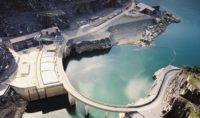Commercial-scale carbon capture and storage (CCS) for coal powerplants moved closer to reality in April after the U.K. approved legislation to subsidize four large-scale CCS demonstration plants. The nation’s Dept. of Energy and Climate Change recently committed “millions” to support front-end engineering and design by two utilities competing to secure subsidies for the first of those plants.

DECC aims next year to decide whether E.ON U.K. plc., Coventry, or a team led by ScottishPower plc, Edinburgh, will get backing for a large demonstration unit able to capture carbon from a 400-MW coal powerplant. The demonstration project is expected to include carbon-dioxide transportation and storage under the North Sea by 2014.
Developed for a competition over the last year, the projects “are at the forefront of the U.K.’s efforts to build one of the first commercial-scale clean coal plants in the world,” says DECC Secretary Ed Miliband. The department will launch similar competitions for another three plants by the end of this year.
“This funding will now enable ScottishPower to take the technology from the concept to the design stage,” says Nick Horler, ScottishPower’s chief executive officer. “It will tell us exactly what we need to know so that we can quickly build this new and essential technology.”
ScottishPower’s scheme would retrofit an existing plant at Longannet, west of Edinburgh and located on the River Forth, which drains into the North Sea. Norwegian technology provider Aker Clean Carbon A.S., Oslo, and Shell Upstream Europe, Aberdeen, are both ScottishPower team members. “The technical and economic challenges ... remain significant,” notes John Gallagher, vice president, technical, Shell Upstream.
E.ON would build a 400-MW CCS unit at its Kingsnorth site on the Medway Estuary, southeast of London. The company is seeking approval for two 800-MW coal power units using supercritical technology at the site. The utility last year recruited Tokyo-based Mitsubishi Heavy Industries Ltd. and Foster Wheeler Energy Ltd., Reading, to help develop its DECC competition bid.
E.ON also has completed scoping studies for a carbon-dioxide pipeline to the North Sea, about 13 km away, that could handle 24 million tonnes a year and serve a cluster of CCS units.
DECC is providing undisclosed cash for the FEED work from a $140-million fund provided by the finance ministry last year. Much larger sums needed for the next, full-scale phase will come from a new utility levy, which is outlined in this month’s new energy act.




